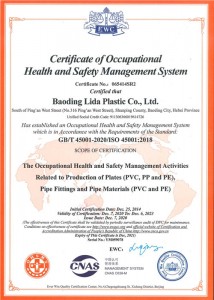Aug . 21, 2024 22:52 Back to list
High-Density Polyethylene Drip Irrigation Pipes for Efficient Water Management Systems
The Benefits and Applications of HDPE Drip Pipe in Agriculture
High-Density Polyethylene (HDPE) drip pipes have revolutionized the agricultural industry by providing an efficient and sustainable method of irrigation. As water scarcity becomes a pressing issue globally, farmers and agricultural specialists are increasingly turning to innovative solutions like HDPE drip pipes to optimize water usage and enhance crop yields. This article explores the various benefits, applications, and environmental significance of HDPE drip irrigation systems.
What is HDPE?
High-Density Polyethylene is a thermoplastic polymer that is known for its high strength-to-density ratio. Its durability and resistance to corrosion make it an ideal choice for irrigation systems. HDPE is lightweight yet robust, making it easy to transport and install. Unlike traditional materials like metal, HDPE does not corrode or degrade over time, ensuring longevity and reducing maintenance costs for farmers.
Benefits of HDPE Drip Pipes
1. Water Efficiency One of the primary advantages of using HDPE drip pipes is their ability to deliver water directly to the root zones of plants. By minimizing water evaporation and runoff, this method ensures that plants receive the precise amount of water they need, reducing waste and promoting healthier growth.
2. Improved Crop Yields With the precise application of water and nutrients, crops are able to thrive. Studies have shown that farms utilizing HDPE drip irrigation experience substantial increases in yield compared to those relying on traditional flooding methods.
3. Soil Conservation Drip irrigation systems minimize soil erosion by delivering water slowly and directly to the soil. This approach helps to maintain soil structure and health, promoting better root growth and preventing nutrient leaching.
hdpe drip pipe

4. Cost-Effectiveness Although the initial setup cost for HDPE drip irrigation systems may be higher than traditional methods, the long-term savings on water usage, labor, and maintenance make it a financially viable option. The durability of HDPE also means less frequent replacements and repairs, further lowering operating costs.
5. Versatility HDPE drip pipes can be used in a variety of agricultural settings, from small-scale gardens to large commercial farms. They are suitable for a wide range of crops, including fruits, vegetables, and ornamental plants, making them a versatile choice for farmers.
Environmental Impact
The application of HDPE drip irrigation systems not only supports agricultural productivity but also has a positive environmental impact. With the infrastructure for water delivery becoming increasingly efficient, there is less pressure on local water resources. Additionally, as farmers adopt sustainable practices, there is a notable reduction in runoff, leading to less contamination of local water bodies.
Moreover, using HDPE drip pipes plays a role in reducing the carbon footprint of agricultural practices. By optimizing water usage, farmers can operate more sustainably, thereby contributing to broader efforts in combating climate change.
Conclusion
The adoption of HDPE drip pipes in agriculture represents a significant leap forward in sustainable farming practices. With their ability to optimize water use, enhance crop yields, and promote soil conservation, these systems are an indispensable tool for modern farmers. As water scarcity continues to challenge agricultural production, innovations like HDPE drip irrigation will be crucial in ensuring food security and nurturing a healthier planet. By investing in such technologies, farmers not only improve their productivity but also contribute to a more sustainable and responsible agricultural landscape.
-
High-Quality PPR Pipes and Fittings Durable ERA PPR & PVC PPR Solutions
NewsJul.08,2025
-
Black HDPE Cutting Board - Durable, Non-Porous & Food Safe HDPE Plastic Cutting Board
NewsJul.08,2025
-
High-Quality CPVC Panel Durable HDPE & PVC Panels Supplier
NewsJul.08,2025
-
Double PE Welding Rod Supplier - High Strength, Durable & Versatile Welding Solutions
NewsJul.07,2025
-
High-Quality PVC-O Pipe Supplier Durable 75mm PVC Pipe & Connections Leading PVC Pipe Company
NewsJul.07,2025
-
HDPE Drainage Pipe Supplier – Durable & Corrosion-Resistant Solutions
NewsJul.06,2025

